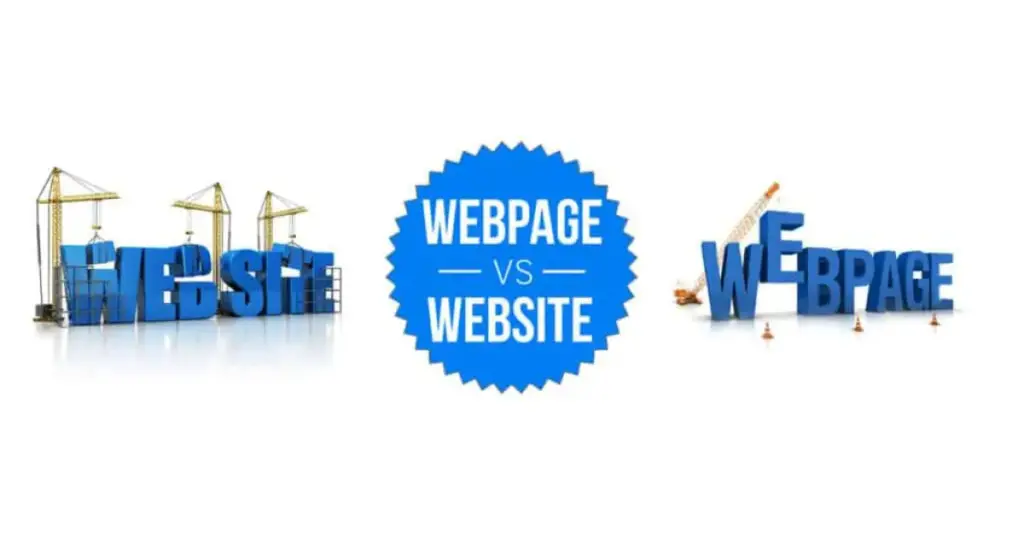Website vs. Webpage: What’s the Difference?
Table of Contents
Are you curious what the difference is between a website and a webpage?
With so much information on the web, it can be easy to understand. If this sounds like you, join us as we explore how websites and webpages differ at our web design company Chicago.
In this post, we’ll shed light on the differences between these two platforms in an accessible way that anyone could understand.
What Is a Website?
A website is a group of web pages created for internet viewing. It offers users information, services, and products via a web browser. Websites can be owned by individuals, businesses, organizations, or governments, and can be public or restricted access.
Components of a Website:
Domain name
A unique identifier that helps users locate the website.
Hosting
The server or platform where the website is stored and accessed.
Web Pages
Interconnected pages accessible through links.
Content
Information, media, and data on the web pages, including text, images, videos, and more.
Navigation
Website structure and design that enables easy movement and access to different pages and sections.
What Is a Web Page?
A webpage is part of a website and is accessed through a web browser. It contains different content types, including text, images, videos, audio, and links, serving various purposes on the website.
Components of a Webpage:
URL
A unique address that allows users to access the webpage through a web browser.
HTML
The primary language used to structure the webpage’s content.
Content
Information and data on the webpage, including text, images, videos, and multimedia elements.
Metadata
Additional information about the webpage, like the title, description, and keywords, aiding search engines and users to understand the webpage’s purpose.
Links
They are clickable elements on the webpage that direct users to other web pages and sections.
Website vs. Webpage
| Website | Webpage | |
| Definition: | A collection of interrelated web pages hosted under a specific domain name. | A single document on the web that can be accessed via a URL. |
| Components: | Multiple webpages, media (images, videos), scripts, database, etc. | Text, images, links, and possibly multimedia elements. |
| Example: | “www.example.com” represents a website. | “www.example.com/contact.html” represents a single webpage. |
| Purpose: | Serve a broader function such as representing a company, offering multiple services, or housing a blog. | Convey a specific piece of information or serve a single purpose. |
| Navigation: | Typically has navigation menus to help visitors find their way around different pages of the site. | Might have internal links or navigation to other parts of the website. |
| Lifecycle: | Often undergoes major redesigns less frequently but might receive periodic updates. | Can be updated or changed frequently without altering the rest of the website. |
| Dependency: | Independent, as it’s the main structure. | Dependent on a website or web server to be accessible. |
| SEO: | Optimization strategies target the entire site, including site speed, architecture, and more. | Individual pages can be optimized for specific keywords or topics. |
Website or Webpage: How to Choose the Right Term
When creating a website or webpage, choosing the correct term is crucial. Here are some tips to help you make the right decision:
Consider your audience
What kind of people will be visiting your site or page? What terms will they be familiar with?
Research your keywords
Use tools like Google AdWords and SEMrush to determine which keywords are searched for the most in your industry.
Please keep it simple
Choose a term that is easy to remember and spell.
Think about SEO
Use a term that is relevant to your content, and that will aid your page rank higher in SE results.
Check availability
Make sure the domain name or page title is available before deciding.
Conclusion
Websites and webpages are crucial for businesses to establish an accessible online presence. A website comprises interconnected pages with different structural planning, while a webpage contains targeted content sections.
Understanding this distinction is vital for effective online development. To create or improve your business’s online presence, seek assistance from a reliable web development agency Chicago to ensure your goals are achieved quickly and smoothly.
